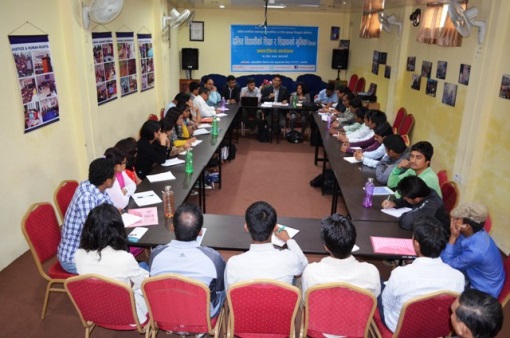
Kathmandu, 31 May 2013- Another milestone in the history of Professional Development and Research Center (PDRC) was achieved on 31st of May as it conducted an interaction program titled “Dalit Students’ Education and the Role of Teachers” as a part of Dalit Civil Society’s 12 Days Campaign against Caste Based Discrimination. The event saw responsible authorities from the education sector along with the development organizations and participants of PDRC- led program- Academic and Intellectual Discourse on Dalit (AI Discourse) put forward the opinions on various issues of discrimination in the education system. The drop out of Dalit students, in particular, was a topic of great interest. Despite the torrential rain, the FEDO Meeting Hall at Kupandole was full of attendees who exhibited concern for the Dalit issues in Nepal.
The program was kicked off with the opening remarks of PDRC president, Mrs. Kamala Hemchuri whose concern was the fundamental right of children, the right to education in the present era of modernization. She shared the shocking dropout rates of Dalit students at school level which is over 14% in the lower secondary level.
The next presentation was from Dr. Pramod Bhatt, one of the resource persons associated with the PDRC’s AI Discourse program and a researcher at Martin Chautari, who initiated with the familiar saying “No Child Left Behind” by Barak Obama and conformed that education is an agent for change, but in –Nepal there are challenges due to lack of accountability on the part of students, teachers, and guardians. Dr. Bhatt expressed that education as a system where the inputs are not the only problem, the bigger challenge is to set up a better process for the better output stressing that though there might not be active discrimination; the passive discrimination still prevails in education. Pointing out a non-affluent background as the cause of comparative below par result of Dalit students, Dr. Bhatt highlighted the need for a “zero-discrimination” environment. He was dissatisfied with the trend of recruiting the non-eligible teachers for the primary level which demands the highest level of skill and ability.
The first session was followed by remarks of Ramesh Nepali from Akhil Nepal Shaikshik Sangh who asserted the triangular relationship among student, teacher, and guardian as the determinant of the student’s progress. For him, it was a mindset of everyone that needs to be changed to better the scenario of Dalit education. According to Mr. Dharma Datta Devkota, the representative of Nepal National Guardian Association, said that the concrete alternatives are necessary rather than the sentiments and the campaigns should be local level oriented along with the establishment of a functional body to monitor and supervise the reach of state-initiated facilities to Dalit. In the same manner, another invitee from Nepal Madhesi Teachers’ Forum, Mr. Upendar Yadav emphasized society as the main source of discrimination and suggested the honest implementation of education mandates as the probable solution of the discrimination.
During the course of remarks, a key insight came from Mr. Rajendra Paudel of Nepal Shikshak Sangh who claimed that it’s the irregularity in policymaking and implementation of government that paves the way for discrimination. In his words, we need to “attack” the government so that the voices for the discrimination-free society and right for education are prioritized. The final guest to make remarks was the president of Nepal Shaikshik Ganatantrik Manch, Mr. Hom K. Thapa who opined that a discrimination minded teacher is not a teacher at all.
Finally, the program was turned participatory and the floor opened where DB Bishwakarma, the Research and Advocacy Officer of PDRC, presented data regarding the dropout of Dalit students and asked what the audience felt were the controlling mechanism. Mr. Bishwakarma’s question was answered by Rajendra Paudel who stated is the lack of accountability that is leading to the high dropout rate. Meanwhile in response to one query from a student regarding “jhole vidhalaye, “ the vice president of NMTF put blame on a flawed government strategy while another guest claimed it as an out –of –authority matter for the teacher’s associations. It was when Mr. Bhim BK from FEDO suggested for an inclusive approach in the local level committee formation, the view of proportionate teacher recruitment from Ramesh Nepali was praised by all with commitment. The program was concluded by one of the campaign leader Bhakta Bishwakarma, also the president of NNDSWO who shared the discrimination related incidents of caste discrimination and politicization which he feels are the causes of Dalit backwardness in education and also asserted that the advocacy from the Non-Dalit side is an effective initiation for a solution.
The authorities ensured the inclusive and participatory approach with the common conclusion that it’s the campaign that should start from 7.4 million students from 0.034 million schools to bring change in every family so that the whole nation would follow the envisioned belief- “ Dalit Education= Discrimination free Nation”.
Copyright © PDRC 2020 | All rights reserved.
Designed and Maintained by Code Logic Technologies Pvt. Ltd.